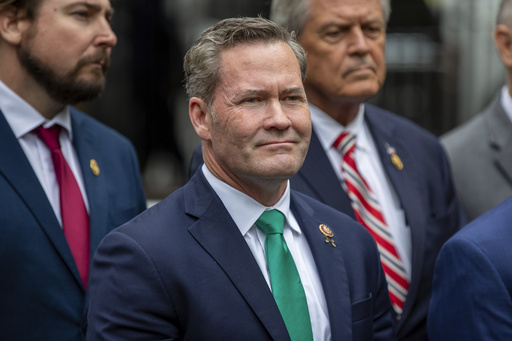
In Washington, the uncertainty surrounding the selection of a new defense secretary for the incoming administration led by President-elect Donald Trump is palpable. With a desire to overhaul the Pentagon, Trump is poised to appoint a loyal ally to follow the tumultuous experiences of his first term, during which five individuals held the position of Secretary of Defense, only to resign, be dismissed, or serve in temporary capacities.
While a final decision has not yet been made, a diverse range of potential candidates for the defense role has emerged. Among the prominent names is Florida Representative Mike Waltz, along with various former loyalists from the Trump administration such as retired Lt. Gen. Keith Kellogg, who previously held significant national security positions. Although former Secretary of State Mike Pompeo was considered a candidate, Trump confirmed via social media that Pompeo would not be joining the upcoming administration.
As Trump maneuvers through the candidates, some of whom are keen to be noticed while awaiting the official results from House races, the choices could be further delayed. The potential candidates include Republican lawmakers whose selection might place them in a precarious situation of leaving their congressional seats empty, raising the stakes of the decision-making process.
Mark Cancian, a senior adviser at the Center for Strategic and International Studies and a retired Marine colonel, noted that the ultimate choice for defense secretary will be indicative of Trump’s approach to the Pentagon going forward. He posits that someone like Waltz, who carries a substantive military background as a former Army officer and Green Beret, may not represent a significant shift compared to other candidates seen as staunch Trump loyalists.
Trump is likely to prioritize individuals who endorse his agenda to reduce U.S. military engagements abroad, manage military resources at the U.S.-Mexico border, and adopt a firm stance against Iran. However, loyalty to Trump’s directives will emerge as a decisive criterion, particularly as he looks to avoid the backlash he faced in his first term from Pentagon leaders.
The relationship between Trump and his military and civilian leadership was characterized by tension and misunderstandings, as officials struggled to navigate abrupt policy changes often laid out in presidential tweets or public statements. Over the course of Trump’s first term, senior defense officials made efforts to temper or delay his directives on contentious issues, from attempts to ban transgender service members to propositions involving the withdrawal of troops from conflicts in Syria, Iraq, and Afghanistan.
Initially, Trump surrounded himself with what he considered strong military personnel and defense industry veterans. He eventually became disillusioned with the generals, believing they lacked the loyalty he expected. Cancian observed that Trump’s changing perceptions might lead to some significant shake-ups within the military hierarchy, including speculation about possible dismissals among top officials.
Air Force Gen. CQ Brown, who commenced his tenure as chairman of the Joint Chiefs of Staff in October 2023, serves at the mercy of the president’s preferences. As a combat pilot and the second Black member to hold this position, he previously addressed racial bias within the military context. Trump’s forthcoming defense secretary is anticipated to express skepticism towards diversity and equity initiatives while being aligned with his policy visions, especially concerning military spending enhancements.
Concerns are also raised about the prospective defense secretary’s willingness to resist unlawful orders. On Thursday, current Defense Secretary Lloyd Austin highlighted this issue, reinforcing that the military’s commitment is to obey genuine orders from the civilian leadership, while emphasizing the oath troops take to defend the U.S. Constitution.
Echoing sentiments from retired Army Gen. Mark Milley, who voiced similar thoughts as his time as chairman of the Joint Chiefs of Staff came to an end, Austin asserted that the military’s oath is not to individual leaders or figures but to the ideals embodied by the Constitution.
Trump’s initial defense secretary, retired Gen. Jim Mattis, quickly learned that silence during press briefings would help him avoid conflicts with the president. Alongside Milley and others like John Kelly and Joseph Dunford, these officials discreetly worked to counterbalance some of Trump’s more provocative military decisions. Their interventions helped delay Trump’s calls for immediate troop withdrawals and staved off the deployment of active-duty troops during periods of civil unrest.
After two years, Mattis resigned due to frustrations with Trump’s national security stance, particularly regarding relations with allies and troop movements in Syria. Following his departure, Patrick Shanahan, his deputy, briefly assumed the role but withdrew amid personal challenges. Army Secretary Mark Esper took over only to encounter similar hurdles, being swiftly dismissed by Trump due to perceived disloyalty, especially after he opposed military intervention during unrest.
In the wake of these developments, Trump issued an appointment for Christopher Miller as acting secretary, surrounding him with loyal supporters, a pattern expected to continue into the new administration’s Pentagon leadership.
